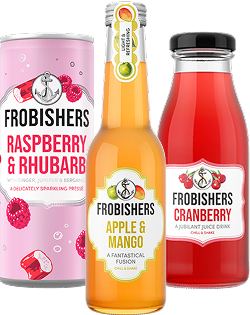Environmental Policy
Overall Aim
At Frobishers, we are committed to promoting sustainable practices in all that we do. We believe that it is our responsibility to protect our planet and its resources for future generations.
We are committed to:
- Calculating and offsetting our scope 1, 2 and 3 carbon emissions every year to maintain our carbon neutral status, disclosing the calculations publicly.
- Reducing our scope 1 and 2 emissions 46% by 2030 from a 2019 base year.
- Making every effort to reduce scope 3 emissions and putting pressure on our suppliers to do the same.
- Purchasing energy from 100% renewable sources.
Sustainable Procurement
Frobishers Juices Ltd aims to ensure that the goods and services it purchases are manufactured, used and disposed of in an environmentally and socially responsible manner. Our purchased decisions should, where practicable, consider the whole life cost of the product and the associated risks and implications for society and the environment.
As part of this we recognise that it is our responsibility to encourage our suppliers to minimise negative environmental and social effects associated with the products and services that they provide. Procurement can make a significant contribution to our goals by ensuring that the goods and services we buy consider optimum environmental performance
When first selecting suppliers we will seek out organisations that share our commitment to sound environmental performance. Where necessary we will look to offer assistance to our suppliers to raise their environmental awareness.
We will work in partnership with suppliers to minimise the environmental and social impacts of our supply chain.
Preference should be given to local suppliers where appropriate and commercially viable.
Frobishers Juices Ltd will use their influence to encourage suppliers to undertake sustainability initiatives both within their local area and in conjunction with their own supply chain.
Where relevant, Frobishers Juices Ltd will evaluate products purchased on the basis of long term value for money, using whole life costing to assess;
- Purchase, routing and supply chain costs.
- Handling and operating costs at final point of discharge and usage.
- Transit packaging costs. Wherever possible we will maximise use of bulk tanker traffic.
- Management costs including staff training, insurance, health and safety and environmental costs.
- Disposal costs.
We will work with suppliers to explore service-based contracts for products to reduce their whole life costs and environmental impacts.
We will encourage suppliers to propose innovations and suppliers will recognise the company’s commitment to sustainability and strive to offer cost effective sustainable solutions.
Key Principles
- Working Together.
We will: - work collaboratively with suppliers in pursuit of this standard.
- guide relationships by the principle of continual improvement.
- consider a similar ethical trading standard as a reasonable alternative where suppliers are already working towards sustainability.
- Making a Difference.
We will and we expect our suppliers to: - develop an environmental and social risk-based approach to the implementation of this standard.
- focus attention on those parts of the supply chain where the risk of not meeting this standard is highest and where the maximum difference can be made with resources available.
- be prepared to demonstrate the basis of the approach with regard to the above.
- Awareness Raising and Training.
We will and we expect our suppliers to: - ensure that all relevant people are provided with appropriate training and guidelines to implement the requirements of this standard.
- Monitoring and Independent Verification.
We will and we expect our suppliers to: - recognise that the implementation of this standard may be assessed through monitoring and independent verification, and that these methods will be developed as our understanding grows.
- the supplier will provide reasonable access to all relevant information, premises, and workers (through interviews) and co-operate in any assessment against this standard – using reasonable endeavours to ensure that sub-contractors do the same.
- Continuous Improvement.
We will and we expect our supplier to: - apply a continual improvement approach in agreeing schedules for improvement plans with suppliers not meeting the full standard.
- base improvement plans on individual case circumstances.
- Ultimately, we will not do business with a supplier where serious breaches of this standard are identified or where the supplier consistently fails to take corrective action within an agreed timescale.
Training and Implementation
Sustainable procurement will be incorporated into the induction, job descriptions and objectives for all relevant staff in the sourcing and supply chain and management processes.
Communication and Reporting
Frobishers Juices Ltd will communicate this policy in all initial communications with new suppliers.
We will recognise those suppliers whose products and services offer the greatest sustainability improvements.




